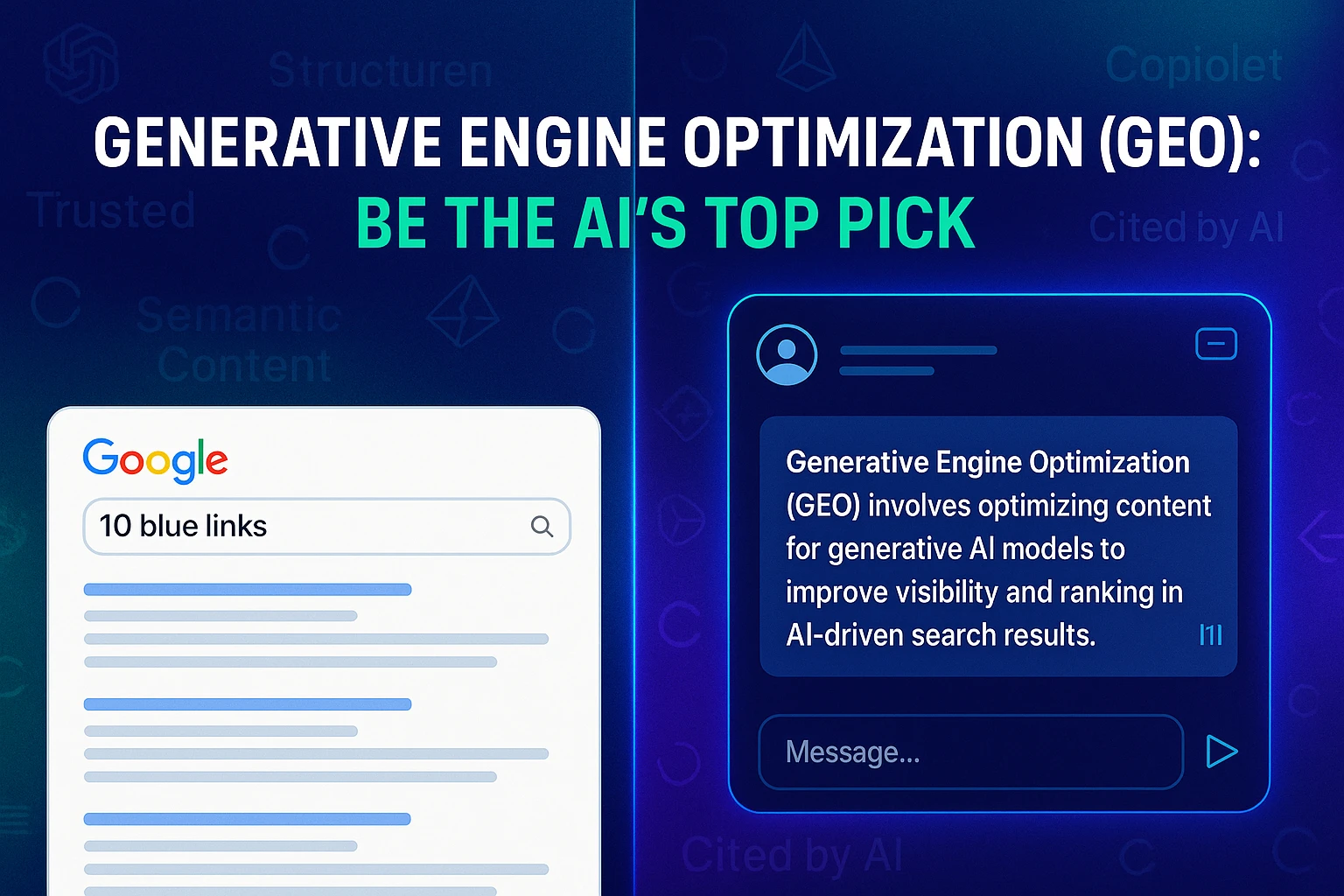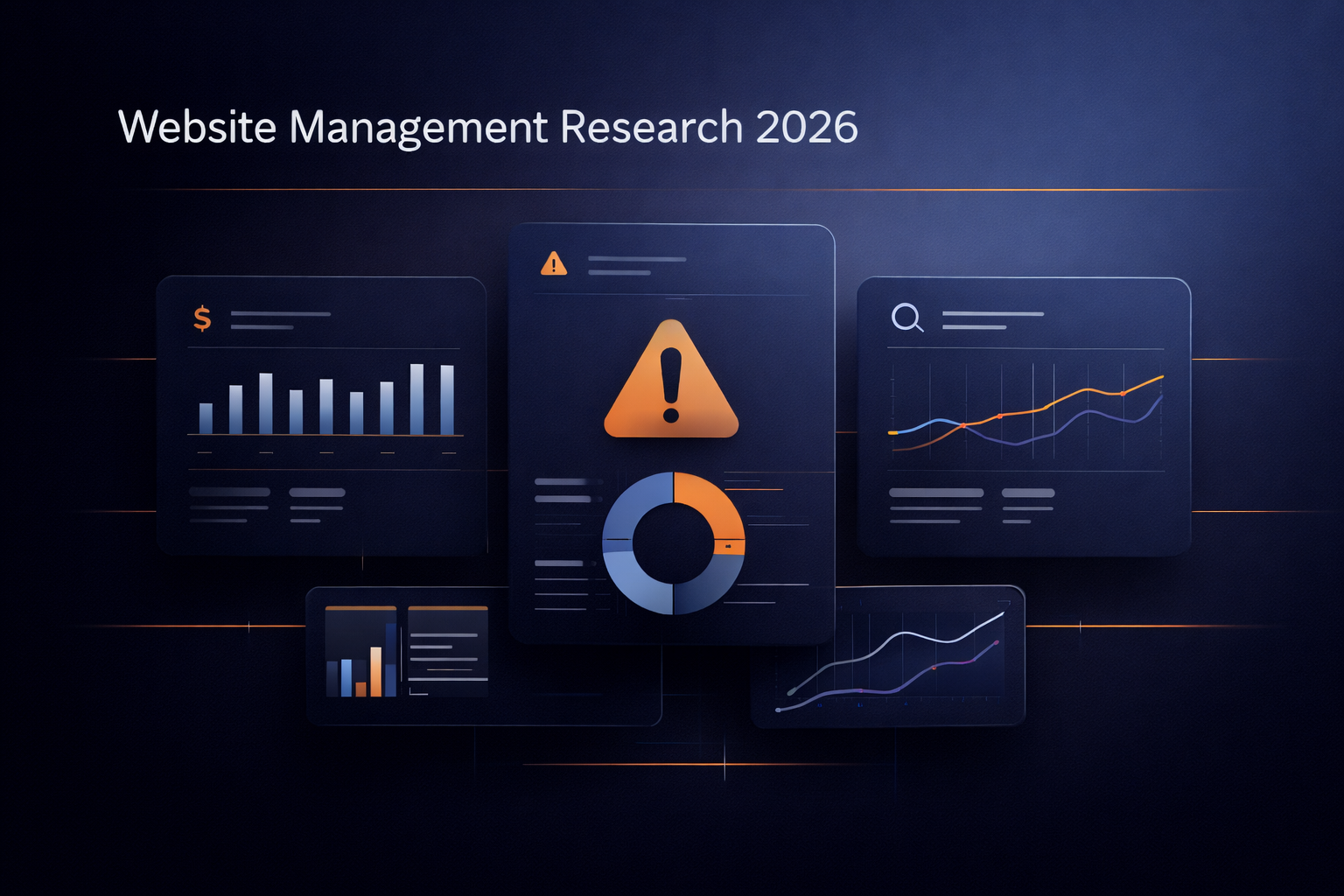Because Google’s not the only gatekeeper anymore.
Let’s be real: if you’re still writing blog posts hoping to rank in Google’s 10 blue links like it’s 2015, you’re playing last season’s game with a broken controller.
AI has barged into the search party, grabbed the mic, and changed the music.
People aren’t just typing into search bars anymore. They’re talking to ChatGPT. They’re asking Gemini for product recs. They’re letting Copilot summarize reports and explain strategies.
That means your content isn’t just competing for page one. It’s competing to be the answer.
Welcome to Generative Engine Optimization (GEO)—the strategy that makes sure AI doesn’t ignore you.
So… What Exactly Is GEO?
In plain terms: GEO is how you get your content seen—and cited—by AI tools.
It’s the practice of optimizing content so that large language models (LLMs) like ChatGPT, Claude, Gemini, and Copilot can:
- Understand it
- Summarize it accurately
- Pull quotes or facts from it
- And possibly even link back to it
Think of SEO as writing for human readers, with Google as the middleman.
GEO is writing for the AI middleman, so it can deliver your content to human readers.
It’s not either/or. It’s yes/and. But the “and” is getting very important.
Why GEO Is a Big Freakin’ Deal
Let’s zoom out.
By 2026, 25% of users are expected to bypass search engines entirely and go straight to AI platforms.
If your content isn’t being referenced by AI?
You’re invisible to a quarter of your potential audience.
And that number is only going up.
GEO gives you:
- Brand visibility inside AI-generated answers
- Organic traffic without chasing Google’s algorithm
- Instant credibility (AI doesn’t cite just anyone)
- A head start while competitors are still keyword-stuffing like it’s 2009
GEO vs SEO: What’s the Actual Difference?
| Feature | SEO | GEO |
| Audience | Humans (via search engine) | AI systems (that then serve humans) |
| Goal | Rank on SERPs | Be cited in AI responses |
| Content Style | Keyword-rich, optimized for search | Semantic, structured, context-rich |
| Focus | Keywords, backlinks, site speed | Language clarity, trust, structure |
| Measurement | SERP position, organic traffic | AI citations, AI referral traffic |
GEO isn’t replacing SEO. But it’s definitely redefining what visibility means.
How AI Actually Picks Content
Spoiler: AI doesn’t “Google” anything.
It doesn’t crawl the internet in real time.
It’s trained on massive datasets and uses those to predict the most useful answers.
AI systems prioritize content that’s:
- Clear
- Structured
- Trustworthy
- Context-rich
- Easy to quote
They love content that:
- Explains things like a confident strategist
- Has defined sections and logical flow
- Doesn’t meander or fluff
- Sounds like it came from someone who knows their niche (e.g. you)
GEO Keyword Strategy: Talk Like a Human, Not a Meta Tag
Forget cramming in “content marketing agency Brooklyn” 17 times. GEO is smarter than that.
Instead, optimize for real, human language—the kind people type or say out loud.
Example:
Bad: best PPC agency
Better: What’s the difference between a PPC agency and a performance marketing firm?
Best: A full, nuanced answer that compares services, outcomes, and pricing models, with links to legit sources
GEO loves:
- Full questions
- Natural phrasing
- Topic depth (not just keywords, but the ecosystem around them)
Pro tip: Use tools like AlsoAsked, AnswerThePublic, and AI-based keyword models to find conversational search terms.
Structure Like a Spreadsheet, Write Like a Smart Human
AI can’t “guess” what you meant. It needs signals—fast.
Here’s how to make your content ultra-digestible:
- Use clear H2s and H3s
Break down ideas. Don’t bury the good stuff. - Keep paragraphs short
Three lines max. Wall of text = wall of silence. - Lead with the answer
Put the TL;DR up top, then dive into the why. That’s what AI likes to quote. - Add schema markup
FAQs, How-Tos, and Reviews give AI extra context. It’s like subtitles for your content.
Establish Authority (Because AI Hates Guessing)
AI wants to quote experts, not opinion bloggers with zero sources.
Show you know your stuff:
- Cite trustworthy sources (think: case studies, industry benchmarks)
- Include expert quotes (your own or guest voices)
- Publish updated data (especially in fast-changing industries like marketing and tech)
- Have an author bio (with real credentials or experience)
Yes—Google’s E-E-A-T still matters, and AI reads that too:
- Experience
- Expertise
- Authoritativeness
- Trustworthiness
No fluff, no vague stats. Show the receipts.
Don’t Forget the Tech: Your Site Still Matters
Even though GEO focuses on AI, your site’s performance still influences results.
Fix the basics:
- Compress images. Your 4MB hero shot isn’t doing you favors.
- Make sure your site’s mobile-friendly. AI tools are accessed mostly on phones.
- Pass your Core Web Vitals. (Ask your dev about LCP, FID, and CLS.)
Bad UX = invisible content.
Fast, clean, mobile-first design = AI-friendly real estate.
How to Know If GEO Is Working
You won’t get a “You ranked #1 on ChatGPT!” notification… yet.
But here’s how to track GEO success:
1. AI Citations
Use tools like Perplexity, ChatGPT with Web Access, or browser plugins to see where you’re being referenced.
2. Referral Traffic
Check analytics for unexpected traffic spikes—especially from Bing, Edge, OpenAI, or Copilot.
3. Branded Search Uplift
Are more people Googling your agency name after asking AI for help? You’re winning.
4. Engagement Metrics
If AI-driven visitors are staying longer or exploring more pages, that’s a green flag.
Future-Proof Your GEO Strategy
GEO is evolving—and fast. Here’s what’s coming:
- Multimodal search (AI pulling from text, image, video, even slideshows)
- Voice-first optimization (Smart assistants will become your next traffic source)
- Source-aware citations (LLMs will more directly credit URLs)
- Feedback loops (The more you’re cited, the more you’re likely to be cited again)
Final Word: Ride the AI Wave or Sink
GEO isn’t a side hustle for your SEO team. It’s the future of being found.
If your content is:
- Structured
- Trustworthy
- Helpful
- Well-written
- Built for AI and humans
…then congrats—you’re not just visible. You’re valuable.
This is the part where your competitors hit snooze.
You? You’re already writing content AI can’t stop quoting.
FAQs (Yes, Even the AI’s Reading This Part)
Q: What is Generative Engine Optimization (GEO)?
A: It’s the practice of optimizing content so AI tools like ChatGPT and Gemini can find it, understand it, and cite it.
Q: How is GEO different from SEO?
A: SEO = Google rankings. GEO = AI citations. Both matter, but they play different roles.
Q: Do keywords still matter?
A: Yep—but GEO prefers full questions and natural phrasing over robotic exact matches.
Q: Does schema markup help?
A: 100%. Structured data makes your content easier for AI to understand and summarize.
Q: Are backlinks still important?
A: Yes—AI uses them as credibility signals, even if it’s not relying on PageRank.





